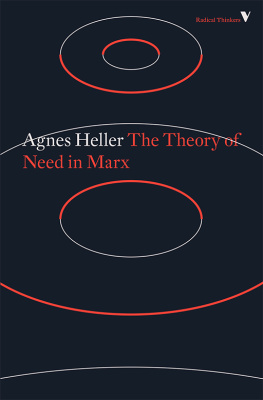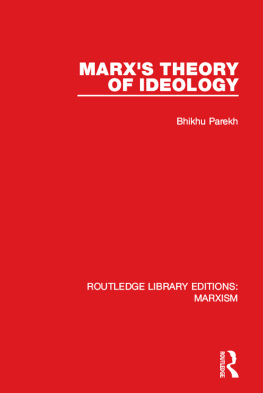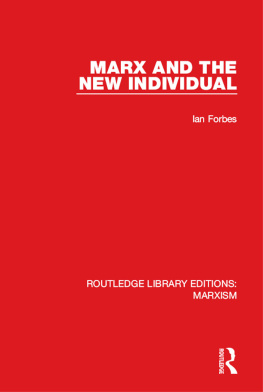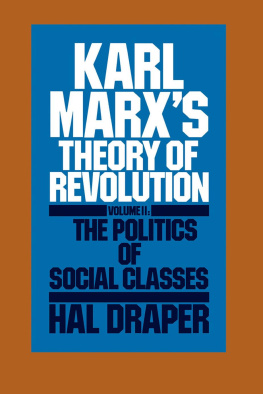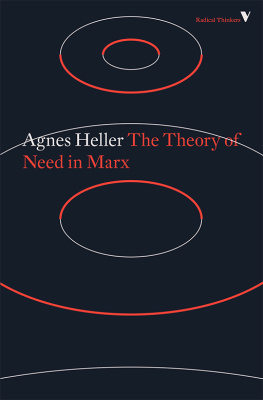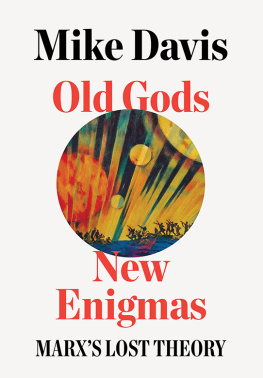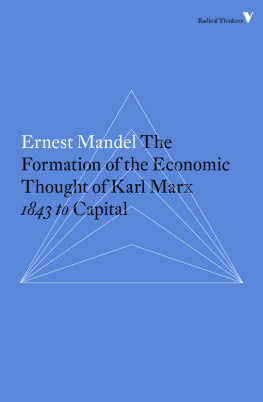Contents

THE THEORY OF NEED IN MARX
AGNES HELLER
The Theory of Need in Marx

This English-language edition published by Verso 2018
First published in English by Allison & Busby Limited 1976
Originally published as Bedeutung und Funktion des
Begriffs Bedrfnis im Denken von Karl Marx 1974
Agnes Heller and Giangiacomo Feltrinelli 1974, 1976, 2018
All rights reserved
The moral rights of the authors have been asserted
1 3 5 7 9 10 8 6 4 2
Verso
UK: 6 Meard Street, London W1F 0EG
US: 20 Jay Street, Suite 1010, Brooklyn, NY 11201
versobooks.com
Verso is the imprint of New Left Books
ISBN-13: 978-1-78663-612-6
ISBN-13: 978-1-78663-614-0 (UK EBK)
ISBN-13: 978-1-78663-613-3 (US EBK)
British Library Cataloguing in Publication Data
A catalogue record for this book is available from the British Library
Library of Congress Cataloging-in-Publication Data
A catalog record for this book is available from the Library of Congress
Printed and bound by CPI Group (UK) Ltd, Croydon, CR0 Y44
CONTENTS
Theories of underconsumption, according to Keynes, hibernated until J. A. Hobson flung himself with unavailing ardour against the ranks of orthodoxy. The theory of need has been totally neglected in Keynes and all other economic orthodoxies. This is surprising because the world at large innocently believes that the whole purpose of economic activity, of production and distribution, is to satisfy human needs and that economists are those who make their special concern the ways and means of doing so. In the works of economists or the history of economic thought there are analyses written at great length and with great complexity of demand and supply, money, the market and market competition. But there is nothing about need (save some little noted work by Bastiat in the last century and by Professor Champernowne in this). The mainstream of academic economics has had nothing to say. The reason for this is that it is assumed right away at the outset that the market automatically indicates human needs. A much used text book of the thirties distinguished for its obsequious but lucid exposition of acceptable doctrine (Benhams Economics) writes:
One intermediary buys from another in the hope that, after transforming the commodity into a form suitable for satisfying wants, he in turn will be able to sell it at a profit. The chain may be very long, but always at the end of it stands the final consumer who buys the consumers goods. We conclude, therefore, that the rationale of economic activity is to satisfy human wants by producing consumers goods.
This said, the whole question of wants and needs is, from the standpoint of economic theory, closed. The human beings needs are treated as a given factor, a sort of instinctive endowment; armed with this he or she enters the market place as buyer and seller to put in unwanted work (disutility) and take out wanted commodities (utility). If wants can be satisfied, the market will produce them; if they cannot, their non-availability on the market or non-purchasability will signal this fact. If, that is, the market is working properly. If it is not, then the economist is the expert who advises on how to repair it. So the whole of economic science becomes the study in health and sickness of these market mechanisms mediated by money.
This was also the arena for Karl Marxs economic studies, but there was an important difference. At the outset he suspected deep flaws in this commodity market system. True, it swept away the brutishness, cruelty and superstition of land ownership with serfdom, but, as he wrote in the early days when he was trying to think out the problems to which it was most necessary to orientate his research:
We have seen what significance, given socialism, the wealth of human need has, and what significance, therefore, both a new mode of production and a new object of production have: a new manifestation of the forces of human nature and a new enrichment of human nature. Under private property their significance is reversed: every person speculates on creating a new need in another, so as to drive him to a fresh sacrifice, place him in a new dependance and to seduce him into a new mode of gratification and therefore economic ruin. Each tries to establish over the other an alien power, so as thereby to find satisfaction of his own selfish need. The increase in the quantity of objects is accompanied by an extension of the realm of the alien powers to which man is subjected, and every new product represents a new possibility of mutual swindling and mutual plundering. Man becomes ever poorer as man, his need for money becomes ever greater if he wants to overpower hostile beings. The power of his money declines so to say in inverse proportion to the increase in the volume of production: that is, his neediness grows as the power of money increases. The need for money is therefore the true need produced by the modern economic system, and it is the only need which the latter produces. (Economic and Philosophic Manuscripts of 1844, page 147, London, Lawrence and Wishart, 1970)
And later on Marx adds: Money is the pimp between mans need and the object, between his life and his means of life (page 165).
In a world still swearing by Adam Smith and free trade, critical analysis of this money system, this commodity or market system was the crucial, essential means towards opening a way to a new mode of production. This critical analysis Marx made a life work the Grundrisse and Capital and it constituted an overwhelmingly powerful proof that the commodity-based structure of capitalism would have to be superseded by some new social structure if the needs of men and women as human beings are to be met. The commodity, money, capital, the economy i.e. the whole development process of market relations which the academic economists assume must automatically reflect human needs far from satisfying human needs, in fact makes this devoutly to be wished goal less and less attainable. True, all sorts of new powers and forces are released as the processes of the capital and money system unfold with the whole world as their arena; but these forces are out of control. The problem is to harness and control them. For all their horrors, we may well allow that these explosive new economic forces have galvanised new human activities and opened new potentialities, freeing human beings from the oppressive torpor of earlier societies. But now they threaten to destroy the species, maybe in a holocaust, maybe person by person, psychologically as much as physically.
The historical explosion of industrial capitalism can be nothing but a transitional process, raising at once the question: After the commodity, money, market economy, what? If an economy structured on commodity relations fails to meet the really human needs of human beings, what structure of social and economic relations can take its place? Out of our present mess where is it that we are trying to get? This is the really important question; not because we can leap all at once into some brave new world, but because we need to find a direction, however we move step by step, inch by inch or mile by mile, as opportunities occur. Otherwise we just go on going round in circles. Marxs analysis and our present experiences of the socio-economic structure of capitalism demonstrate that its problems are not peripheral and correctable but are rooted in the structure itself. They become more and more acute as time goes on. If this failing structure is one based on the socio-economic relations of commodity exchange, to what new structural forms should we change and how? This question cannot be answered until we think far more deeply and see far more clearly what our real needs as human beings are and recognise the forms of distortion and perversion to which the socio-economy of capitalism subjects our humanity. We talk glibly of socialism as production for use; this is meaningful as posing an antithesis to production for the market. A thing is useful because it meets a human need. Adam Smith taught that the market would inform the producer what he should produce. If the market is set aside or used only subordinately, who decides what is to be produced and how? What are the really human needs of really human activity?

